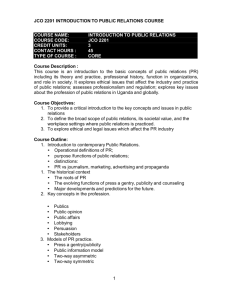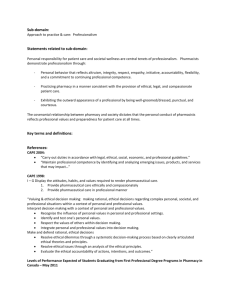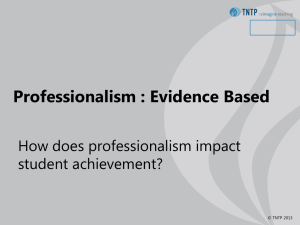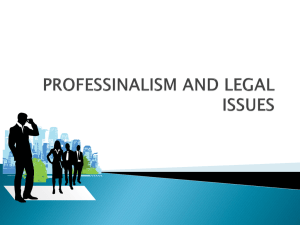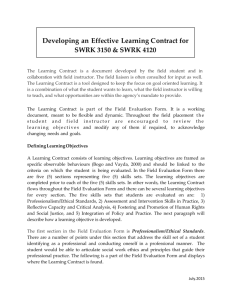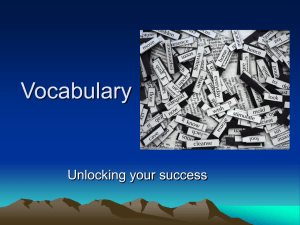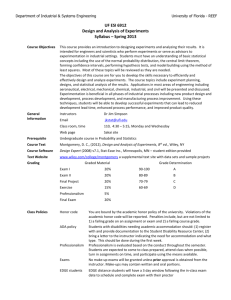Innovation, Ethics and Values
advertisement
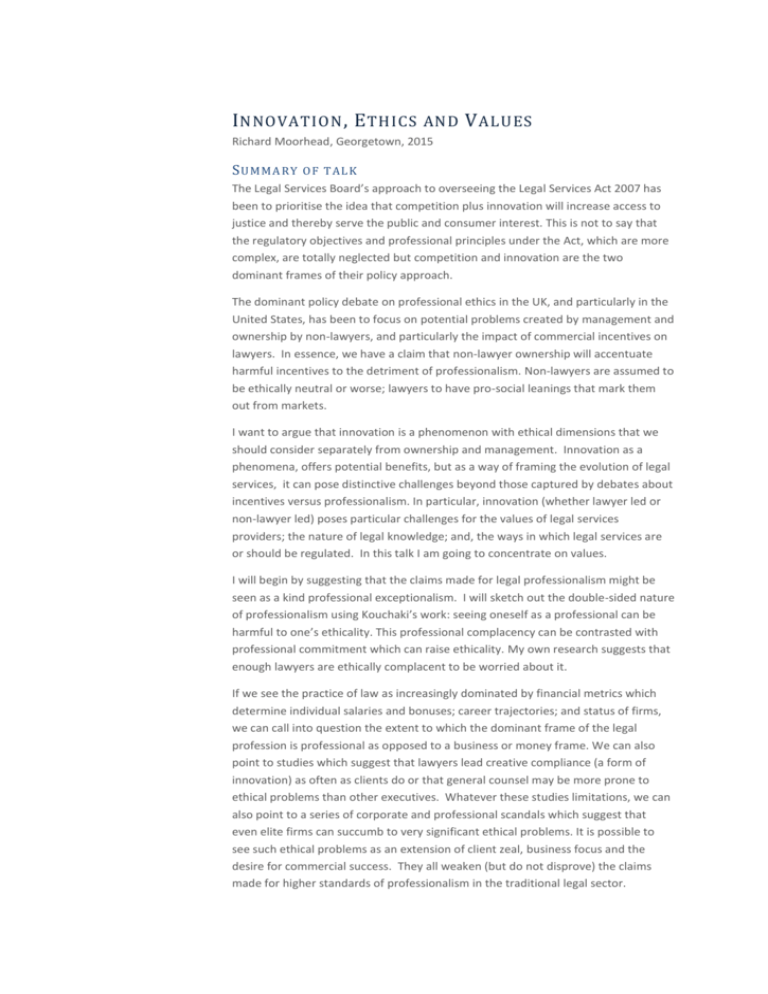
I NNOVATION , E THICS AND V ALUES Richard Moorhead, Georgetown, 2015 S UM M A R Y O F T A LK The Legal Services Board’s approach to overseeing the Legal Services Act 2007 has been to prioritise the idea that competition plus innovation will increase access to justice and thereby serve the public and consumer interest. This is not to say that the regulatory objectives and professional principles under the Act, which are more complex, are totally neglected but competition and innovation are the two dominant frames of their policy approach. The dominant policy debate on professional ethics in the UK, and particularly in the United States, has been to focus on potential problems created by management and ownership by non-lawyers, and particularly the impact of commercial incentives on lawyers. In essence, we have a claim that non-lawyer ownership will accentuate harmful incentives to the detriment of professionalism. Non-lawyers are assumed to be ethically neutral or worse; lawyers to have pro-social leanings that mark them out from markets. I want to argue that innovation is a phenomenon with ethical dimensions that we should consider separately from ownership and management. Innovation as a phenomena, offers potential benefits, but as a way of framing the evolution of legal services, it can pose distinctive challenges beyond those captured by debates about incentives versus professionalism. In particular, innovation (whether lawyer led or non-lawyer led) poses particular challenges for the values of legal services providers; the nature of legal knowledge; and, the ways in which legal services are or should be regulated. In this talk I am going to concentrate on values. I will begin by suggesting that the claims made for legal professionalism might be seen as a kind professional exceptionalism. I will sketch out the double-sided nature of professionalism using Kouchaki’s work: seeing oneself as a professional can be harmful to one’s ethicality. This professional complacency can be contrasted with professional commitment which can raise ethicality. My own research suggests that enough lawyers are ethically complacent to be worried about it. If we see the practice of law as increasingly dominated by financial metrics which determine individual salaries and bonuses; career trajectories; and status of firms, we can call into question the extent to which the dominant frame of the legal profession is professional as opposed to a business or money frame. We can also point to studies which suggest that lawyers lead creative compliance (a form of innovation) as often as clients do or that general counsel may be more prone to ethical problems than other executives. Whatever these studies limitations, we can also point to a series of corporate and professional scandals which suggest that even elite firms can succumb to very significant ethical problems. It is possible to see such ethical problems as an extension of client zeal, business focus and the desire for commercial success. They all weaken (but do not disprove) the claims made for higher standards of professionalism in the traditional legal sector. Having problematized the professional conceit, I will then look at how personal values may influence ethical decision-making as a way of beginning to see how innovation may pose distinctive questions. I will briefly report on experimental research looking at the interaction between personal values and professional decision-making in lawyers that I had been conducting with Rachel Cahill O’Callaghan and others. This will demonstrate how sophisticated lawyers when deciding simplified ethical problems designed to simulate opportunities for ethical risk-taking in commercial practice are motivated by values associated with commercial self-interest and values more closely associated with innovation and competition when taking the risker path. The idea that this may pose questions about the ethicality of the innovators mindset is reinforced by looking at research from Francesca Gino and others where sometimes quite subtle framing of cultures or individual tasks towards aspiration or creativity demonstrably (in lab conditions) increases unethical conduct. What these studies do not do, because they cannot, is balance the potential upsides of innovation with potential ethical downsides. Innovation can plainly be both good and bad. Atul Gawande’s prosaic, but carefully evidenced, use of checklists is an example of how “boring” innovation can dramatically enhance the public good through the kinds of systems that are seen as a challenge to professionalism. He saved lives by getting nurses to better control doctors with tick boxes. Standard Chartered bank’s use of legal advice and automated systems to “enforcement proof” wire stripping of unlawful Iranian actual transactions is a counter-example. Here innovation helped launder dubious transactions. To return to alternatively owned business structures, we can talk about three well known examples. Quindell Riverview and Slater and Gordon have very different (to my eyes) statements of values: one is very commercially driven by financial targets cascaded through the company; another claims to be very client and process driven; the other sets out explicitly very orthodox set of professional values which puts the interests of justice (they say) before even the interests of the client. To understand the quality and ethicality of those practices and to understand the impact of their innovations, one would also have to understand truth behind those value claims but the fact that they define themselves in those terms is an interesting start. It is also possible to see how regulation may impact on the values of practising any particular area: either through selection or socialisation. This outlines the case for taking the values dimension of innovation more seriously. What of the challenge to legal knowledge? There are many ways of thinking about this, but if we imagine that innovation is likely to lead to more systemisation, less application of bespoke professional reasoning; and in the field of artificial intelligence and machine learning to a greater reliance on probabilistic rather than analytical reasoning then we have a way of working and thinking which is rather different from the way lawyers think (of themselves as thinking). We’ve already seen, perhaps, some signs in the UK of the courts struggling with when a client/firm uses an online case portal to take their case forward. The firm had to take the risk of the client ticking the wrong box. Similarly, they selectively resist the idea that an economically efficient way of dealing with cases might allow lawyer to lower the bar of what is expected in terms of professional negligence (in a pro bono case). It is anybody’s guess how the courts will deal with systems of litigation support based on probabilistic rather than analytic approaches. A second way in which innovation poses challenges to knowledge is in the process of claim and counterclaim made around whether or not innovation is working. It is rare to see solid evidence in support of new techniques or systems for delivering legal services. Decision support systems which help litigators pitch their negotiation offers or machine learning approaches which help code contracts or assist with ediscovery rarely, with some notable exceptions, seem to provide much by way of solid evidence on how well new techniques really work. Commercial sensitivity trumps transparency of course and the absence of evidence is no different from the way professional service firms have been working for years but it may be a missed opportunity for innovators keen to supplement their entrepreneurial zeal with a more substantial patina of public interest. We will largely be dependent on the market working out what works or not. The normal information symmetry presented by lawyer and client may be magnified by the technological sophistication of genuine innovation. In England and Wales we have seen some intervention from regulators keen to research emerging areas, though even the better examples are rather modest in scale. Really big issues (claims capture by insurance companies) lie apparently untouched. One reason that this is so may be the historically explicable but (in policy terms) arbitrary way in which our regulatory scheme draws boundaries around a limited set of reserved legal services (in particular, litigation, advocacy in courts, limited elements of real property transfer and probate but not the giving of legal advice more generally or “the practice of law”). Most of the potentially ‘game changing’ innovations which I have talked about can or do lie outside of this regulatory structure. Interestingly it seems likely that online dispute resolution is explicitly excluded from legal services regulation under the Act. My point is not to undermine the claims of innovation but to recognises that it poses unique problems and, alongside the weaknesses in professionalism, emphasises (for me) doubts about the quality of our regulation. I would venture to suggest that our understanding of, and confidence in, regulatory tools available to professional regulators is low. Ethicists working in science and technology tend to emphasise a more reflexive, meta-style of regulation than the legal profession is used to or comfortable with. Lawyers prefer to be left alone with rules. I’d like to think there were things that might be done to close some of the gap. My position on this is not one of panic but it is one of mild anxiety. Innovators need to focus on the ethical dimensions to their practice as well as to the commercial and policy claims. In crude terms, the conservatism and lack of critical self-reflection which typifies traditional professionalism is met with an alternative frame which is to focus narrowly in terms of innovation and competition: means to ends rather than ends in themselves. Potential problems with business models transcend the alternative and traditional sectors; values problems transcend the sectors; as does the generation of evidence (if it occurs at all) which is weak, self-serving and less than transparent. We should encourage innovation and reinvigorate professionalism, mindful of the current limitations on what we know and what we do. An interesting question is whether a more relational style of regulating can deliver better on that.
